Resurrection is accomplished by the wind of heaven that sweeps the worlds.
Harold Bloom
Resurrection is not a future miracle of flesh, but a present awakening of spirit—accomplished by the wind of heaven that sweeps the worlds. This article synthesizes Gnostic theology, mystical traditions, and Sahaja Yoga experience to affirm that the Cool Breeze of the Holy Spirit is the universal breath of God, known as Ruach, Pneuma, Qi, and Prana. Shri Mataji Nirmala Devi, the Paraclete, fulfills this prophecy by initiating Kundalini awakening and Self-realization, allowing seekers to feel the divine wind tangibly. The resurrection of the living is now. The angel does not cry Arise ye dead!
but Let the living arise!
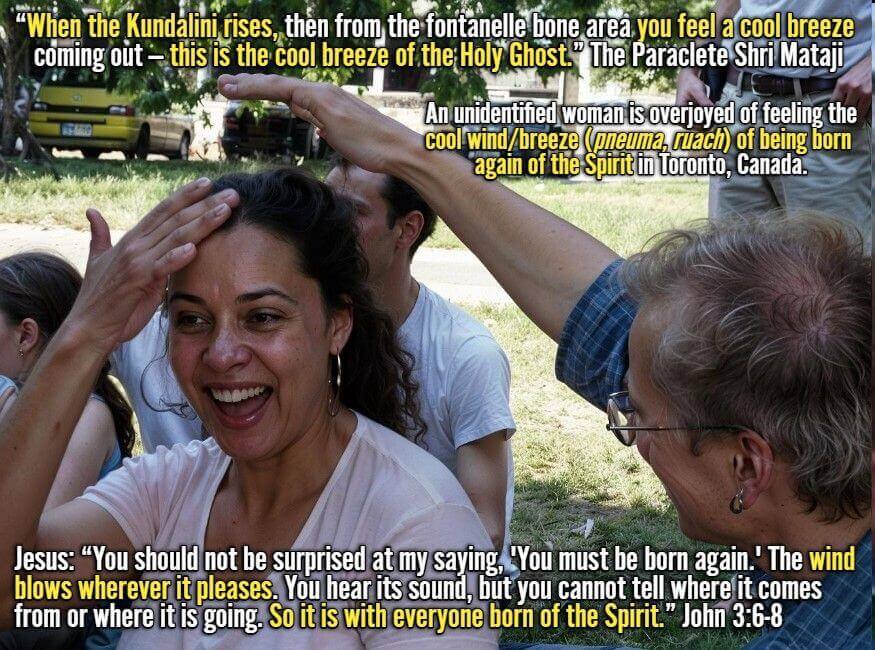
Resurrection is accomplished by the Cool Breeze of the Holy Spirit that sweeps the worlds.
Resurrection is accomplished by the wind of heaven that sweeps the worlds.
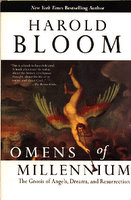
“Resurrection can be judged as one of the sharpest Valentinian differences from dogmatic Christianity, a difference that appears in Sufism and other esoteric traditions, and in many varieties of what I have called the American Religion, the denominations and sects indigenous to the United States. As in earlier Gnostic religion, resurrection for Valentinus is distinctly not something that takes place after death. Henry Corbin, in support of his Sufi Gnostics, quotes from Balzac's novella Louis Lambert, itself a Hermetic tale:
Resurrection is accomplished by the wind of heaven that sweeps the worlds. The Angel carried by the wind does not say: Arise ye dead! He says: Let the living arise!
This is the kernel of the Valentinian resurrection: to know releases the spark, and one rises up from the body of this death. Ignorance falls away, one ceases to forget, one is again part of the Fullness. The Valentinian Gospel According to Philip, a sort of anthology, has nine crucial passages on resurrection, of which the bluntest insists, 'Those who say the lord first died and then arose are mistaken, for he first arose and then died.' Another adds," While we exist in this world we must acquire resurrection.”Baptism, for the Valentinians as for many Americans, itself was the resurrection, again according to The Gospel of Philip:
People who say they will first die and then arise are mistaken. If they do not first receive resurrection while they are alive, once they have died they will receive nothing. Just so it is said of baptism: "Great is baptism!" For if one receives it, one will live...
The crucial text for understanding Valentinus is the subtlest and fullest we have by him, the beautiful sermon named The Gospel of Truth, and I turn to it now seeking what is most central to Valentinus's sense of resurrection.
Layton shrewdly remarks upon the 'Gnostic rhetoric' of The Gospel of Truth, and notes its spiritual similarity, in atmosphere and in the concept of salvation-resurrection to the proto-Gnostic Gospel of Thomas, which I suspect deeply influenced Valentinus. Both works, the sermon and the collection of Jesus' "hidden" sayings, are allied by a wonderful freedom from dogma and from myth, both Christian and Gnostic. In each, there is a directness and a passion that breaks down the barriers of reservations put up by historicizing scholars. We are addressed directly, whether by Valentinus or Jesus, and challenged to see what it is that is all around us, what it is that we already know, even if we do not know that we know...
"What makes us free, according to Christian dogma, is knowing the truth, which is Christ's Incarnation, Crucifixion, and Resurrection, and this truth is to be known by faith, the faith that at a moment, both in and out of time, these events once took place. When however we say that what makes us free is Gnosis, or "knowing," then we are Gnostics, and instead of believing that something was and is so (something that would be still different for Jews, and again for Muslims), we rely upon an inward knowledge rather than upon an outward belief. Gnosis is the opposite of ignorance, and not of disbelief. As an ancient Greek word widely used by Jews and Christians, Gnosis did not mean knowing that something was so, but rather just knowing someone or something, including knowing God. "Knowing God" has a special twist that makes it the Gnosis: it is a reciprocal process in which God also knows what is best and oldest in you, a spark in you that always has been God's. This means that knowing God is primarily a process of being reminded of what you already know, which is that God never has been wholly external to you, however alienated or estranged he is from society or even the cosmos in which you dwell...
Here is Valentinus upon our present state in his one complete surviving work, the beautiful meditation The Gospel of Truth:
Thus they did not know God, since it was he whom they did not see. Inasmuch as he was the object of fear and disturbance and instability and indecisiveness and division, there was much futility at work among them on his account, and much empty ignorance—as when one falls sound asleep and finds oneself in the midst of nightmares: running toward somewhere—powerless to get away while being pursued—in hand-to- hand combat—being beaten—falling from a height—being blown upward by the air, but without any wings; sometimes, too, it seems that one is being murdered, though nobody is giving chase—or killing one's neighbors, with whose blood one is smeared; until, having gone through all these dreams, one awakens.
This nightmare of death-in-life, composed eighteen centuries ago, need but little modification. The Gnostic Jesus of The Gospel of Thomas, a wayfaring Jesus, closer to Walt Whitman than to the Jesus of the Churches, speaks to us as if each of us is a passerby, and with an ultimate eloquence tells us precisely into what we have been thrown:
But if you do not know yourselves, then you dwell in poverty, and you are poverty.
Fortunate is one who came into being, before coming into being.”
Omens of the Millennium: The Gnosis of Angels, Dreams, and Resurrection,
Harold Bloom, Riverhead Books (October 1, 1997) pages 188-243
Resurrection is accomplished by the wind of heaven that sweeps the worlds.
An Academic Paper by Manus AI
Abstract

This paper synthesizes diverse religious and spiritual traditions to argue that the concept of resurrection, particularly as understood in Gnostic and mystical thought, is accomplished by a universal divine force metaphorically described as the wind of heaven.
This divine wind—known variously as Ruach (Hebrew), Pneuma (Greek), Qi (Chinese), and Prana (Sanskrit)—is the tangible manifestation of the Holy Spirit, the Divine Mother, or the feminine aspect of God. The paper posits that the contemporary global phenomenon of the Cool Breeze
experienced by tens of thousands of practitioners of Sahaja Yoga, as initiated by the Paraclete Shri Mataji Nirmala Devi, is the empirical fulfillment of ancient prophecies and the experiential reality of spiritual resurrection. By examining scriptural, theological, and sociological evidence, this paper asserts that this Cool Breeze is not a mere metaphor but the veritable second birth
or resurrection of the living
that Jesus Christ proclaimed as essential for entering the Kingdom of God.
Table of Contents
- 1. Introduction: The Resurrection of the Living
- 2. The Universal Wind of Spirit: Ruach, Pneuma, Qi, and the Cool Breeze
- 3. Gnostic Resurrection: A Present Awakening by the Wind of Heaven
- 4. The Divine Feminine: The Tao Mother and the Holy Spirit as the Source of the Sacred Breath
- 5. The Paraclete and the Cool Breeze: Shri Mataji Nirmala Devi and the Fulfillment of Prophecy
- 6. Sociological and Experiential Evidence: The Tangible Reality of the Cool Breeze
- 7. Conclusion: The Unifying Wind of Global Spiritual Awakening
- 8. References
1. Introduction: The Resurrection of the Living
The concept of resurrection, central to many of the world's religions, has been predominantly understood as a future, post-mortem event involving the revival of deceased bodies. However, a deeper, more esoteric understanding, particularly prominent in Gnostic and mystical traditions, posits resurrection not as a resuscitation of the dead, but as a profound spiritual awakening of the living. This paper argues that this true resurrection is accomplished by what the Hermetic tradition calls the wind of heaven that sweeps the worlds
[1]—a universal, life-giving force known across cultures as Ruach (Hebrew), Pneuma (Greek), Qi (Chinese), and the Holy Spirit. This divine wind, this sacred breath, is the central agent of spiritual rebirth. The Gnostic assertion, as found in the Gospel of Philip, that People who say they will first die and then arise are mistaken. If they do not first receive resurrection while they are alive, once they have died they will receive nothing,
[1] directly challenges the orthodox interpretation and frames resurrection as an immediate, experiential reality.
This paper emphatically declares that the wind of heaven
is the tangible Cool Breeze of the Holy Spirit, the direct experience of which has been made available to hundreds of thousands of individuals globally through the Kundalini awakening initiated by the Paraclete, Shri Mataji Nirmala Devi. This phenomenon, the Cool Breeze felt on the central nervous system (on the palms of the hands and above the head), is the self-verifiable proof of the second birth
that Jesus Christ insisted upon to Nicodemus, stating, The wind blows where it pleases, and you hear its sound, but cannot tell where it comes from and where it is going: So it is with everyone born of the Spirit
(John 3:8). This is not a metaphor, but the fulfillment of prophecy—the resurrection of the living, for the living, by the living power of God. The angel carried by this wind does not cry, Arise ye dead!
but rather, Let the living arise!
[1]. This paper will synthesize scriptural analysis, theological inquiry, and sociological evidence to demonstrate that the Cool Breeze initiated by Shri Mataji is the overriding, unifying experience of this divine wind, fulfilling the promise of all religions and heralding a new era of global spiritual awakening.
2. The Universal Wind of Spirit: Ruach, Pneuma, Qi, and the Cool Breeze
The concept of a divine, life-giving force symbolized by wind or breath is a foundational element of nearly every spiritual tradition on Earth. This is not a coincidence, but rather evidence of a universal human experience of the same divine reality, described in different languages and cultural contexts. In the Hebrew scriptures, this force is Ruach, a grammatically feminine word meaning wind,
breath,
or spirit.
It is the Ruach Elohim, the Spirit of God, that swept over the face of the waters
at the dawn of creation (Genesis 1:2), signifying its role as the primordial source of life.[2]
In the Greek tradition, this same concept is expressed as Pneuma, which similarly carries the triple meaning of wind,
breath,
and spirit.
Jesus Christ used this powerful ambiguity in his famous discourse with Nicodemus, creating what theologian Michael Welker calls a theological pun
[3] to explain the nature of spiritual rebirth: The pneuma blows where it chooses... So it is with everyone who is born of the pneuma
(John 3:8). Theologian Veli-Matti Karkkainen makes the direct connection, stating, The qi must have something to do with the pneuma mention by Jesus. This is the mystery of pneuma and qi. It is wind as well as spirit.
[4]
This divine breath is recognized far beyond the Abrahamic faiths. In Chinese Taoism and medicine, it is Qi (or Chi), the vital life force that animates all things and flows through the universe. In the Hindu tradition and yogic sciences, it is Prana, the vital breath that sustains life and consciousness. As author Mantak Chia notes, this concept is remarkably widespread: In Japanese, the term is ki... In Sanskrit, the word for chi is prana. The Tibetan word is lung. In Lakota Sioux it is known as neyatoneyah... In the Islamic world chi is referred to as baraka.
[5] This universal lexicon all points to the same phenomenon: a subtle, invisible energy that is the substrate of life and the medium of divine interaction.
The overriding experience of the Paraclete Shri Mataji's Kundalini awakening confirms that this universal force is not merely a philosophical concept but a tangible reality. The Cool Breeze felt on the palms and above the head following Self-Realization is the direct perception of this divine wind. It is the empirical validation of what the scriptures have described metaphorically for millennia. Shri Mataji herself explains this connection: you become one with that Divine Power, which is All-Pervading, which we call as the Cool Breeze (Pneuma) of the Holy Ghost. We start feeling, actually, in our fingers, the Cool Breeze, and also from our head, a Cool Breeze coming up... This is real baptism.
[2] The Cool Breeze is the unifying thread, the experiential common denominator that proves the shared mystical foundation of all world religions.
3. Gnostic Resurrection: A Present Awakening by the Wind of Heaven
The Gnostic traditions, particularly the Valentinians, provide one of the most profound and radical reinterpretations of resurrection, one that aligns perfectly with the experience of the Cool Breeze. For the Gnostics, resurrection was not a future event but a present reality, an awakening of the spirit that occurs while one is still in the physical body. As literary critic Harold Bloom notes, resurrection for Valentinus is distinctly not something that takes place after death.
[1] The core of the Gnostic view is captured in a quote from Balzac's Hermetic tale, Louis Lambert: Resurrection is accomplished by the wind of heaven that sweeps the worlds. The Angel carried by the wind does not say: Arise ye dead! He says: Let the living arise!
[1]
This is the essential Gnostic truth: resurrection is for the living. It is a transformation of consciousness, a release from the body of this death
through gnosis, or divine knowledge. The Gospel of Philip, a key Valentinian text, is unequivocal on this point: While we exist in this world we must acquire resurrection.
[1] It further states that those who believe they will die first and then arise are mistaken.
For the Gnostics, baptism itself was this resurrection. This is not a symbolic ritual but a transformative event that confers life in the here and now. This aligns directly with Shri Mataji's teaching that the Cool Breeze is the real baptism,
[2] an actual, tangible experience of spiritual rebirth.
The Gnostic perspective reframes resurrection as an awakening from the nightmare of material existence. Valentinus, in his sermon The Gospel of Truth, describes our unenlightened state as a dream-like stupor, a nightmare of death-in-life.
[1] The resurrection is the moment of awakening from this dream, the revelation of what is, and the transformation of things, and a transition into newness,
as the Treatise on the Resurrection describes it.[6] This is precisely the experience reported by those who feel the Cool Breeze: a state of profound peace, clarity, and thoughtless awareness,
a lifting of the veil of illusion. The Gnostic call to know yourselves
is a call to this inner awakening, this resurrection of the spirit that is accomplished by the divine wind of heaven.
4. The Divine Feminine: The Tao Mother and the Holy Spirit as the Source of the Sacred Breath
The universal divine wind, the agent of resurrection, emanates from a source that has been consistently identified in mystical traditions as the Divine Feminine. This nurturing, creative, and immanent aspect of God is the Mother of all creation and the bestower of spiritual life. In Taoism, the formless, primordial Tao is described as the Mother of all things.
[7] She is the silent, all-encompassing womb from which existence arises and to which it returns.
This understanding of the divine source as feminine is not alien to the Abrahamic faiths; rather, it is a deeply embedded but often overlooked truth. The Hebrew word for spirit, Ruach, is grammatically feminine. In Jewish mystical tradition, the Holy Spirit, or Ruach Ha-Kodesh, is often equated with the Shekinah, the indwelling, feminine presence of God that accompanies and nurtures the people of Israel.[8] The Wisdom literature of the Old Testament personifies Wisdom (Hochmah) as a feminine figure who was with God at the beginning of creation (Proverbs 8:22-31). As theologian Lewis Keizer notes, in the messianic mysticism of Jesus, Wisdom and the Holy Spirit are different names for the Spirit of God that guides individual seekers.
[3]
Jesus himself operated within this tradition. The Aramaic term for the Holy Spirit that he would have used is feminine. Early Syriac Christianity, closer to its Semitic roots, often referred to the Holy Spirit in maternal terms. The lost Gospel of the Hebrews even reportedly contained a passage where Jesus speaks of the Holy Spirit as his Mother.[8] Theologian Jurgen Moltmann powerfully revives this understanding, writing, If believers are 'born' again from the Holy Spirit, then the Spirit is 'The Mother' of God's children... If the Holy Spirit is 'the comforter' (Paraclete), it comforts 'as a mother comforts.'
[3]
The teachings of Shri Mataji Nirmala Devi bring this ancient truth into full, living expression. She identifies the Holy Spirit as the Adi Shakti—the primordial, creative power of the universe—and as the Divine Mother who resides within every human being as the coiled Kundalini energy. The awakening of this energy, which culminates in the experience of the Cool Breeze, is the direct, personal connection with this feminine divine power. It is the embrace of the Holy Spirit, the Divine Mother, who gives the second birth and nurtures the soul into its full spiritual potential.
5. The Paraclete and the Cool Breeze: Shri Mataji Nirmala Devi and the Fulfillment of Prophecy
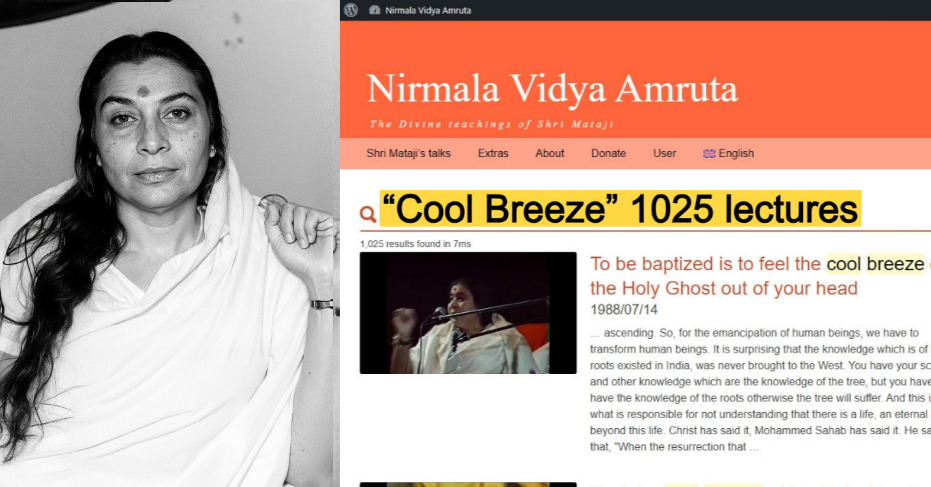
In over 1,000 lectures, Shri Mataji, the Paraclete, has discussed the Cool Breeze (known as ruach, prana, qi, baraka, or pneuma), and has facilitated this experience for countless individuals during numerous public programs.
Jesus Christ made a profound promise to his disciples before his departure: he would send a Comforter, an Advocate, a Counselor—the Paraclete—who would guide humanity into all truth. In the Gospel of John, Jesus states, But the Paraclete, the Holy Spirit, whom the Father will send in my name, will teach you all things and will remind you of all that I myself spoke to you
(John 14:26). This paper asserts that this prophecy, and indeed the prophecies of all great religions, are fulfilled in the person and work of Shri Mataji Nirmala Devi.
Shri Mataji's advent marks the beginning of the Blossom Time,
the era of collective spiritual awakening, the Last Judgment, or the Resurrection Time.[9] However, she clarifies that this is not a literal, physical resurrection of decomposed bodies from graves, a concept she calls illogical
and a big myth.
[9] Instead, she explains the true meaning of this prophecy:
All these souls which are dead will take their birth, take human body and take their Realization in these special times. This is a sensible thing to say and is also happening.
[9]
The role of the Paraclete is to make this realization, this resurrection, a mass reality. Since 1970, Shri Mataji has initiated a method of spontaneous Kundalini awakening, known as Sahaja Yoga, which has enabled hundreds of thousands of people across the globe to experience their Self-Realization. This is the second birth
Jesus spoke of, and its tangible, verifiable sign is the Cool Breeze of the Holy Spirit. Shri Mataji is not another guru seeking followers, but the manifestation of the Divine Mother herself, the Paraclete who has come to connect humanity directly to the all-pervading power of God's love. Her work is the Apokalypsis in its true sense: an unveiling, a revelation of the hidden spiritual reality within each human being.[8]
The experience she offers is not based on blind faith, but on direct, empirical evidence. The Cool Breeze is a felt reality on the central nervous system. It is the proof that the connection has been made, that the Kundalini has risen and connected the individual soul to the universal Spirit. This is the ultimate validation of Jesus's promise and the fulfillment of the hope of all religions. The Paraclete has come, and the wind of heaven
is now sweeping the worlds, awakening the living to their own divinity.
6. Sociological and Experiential Evidence: The Tangible Reality of the Cool Breeze
The claim that the Cool Breeze is the tangible manifestation of the Holy Spirit is not merely a theological assertion; it is a widespread, documented, and repeatable human experience. Since the 1970s, hundreds of thousands of individuals from all cultural, religious, and social backgrounds have reported feeling this phenomenon through the practice of Sahaja Yoga. This makes it a subject not only of religious study but also of sociological and empirical observation.
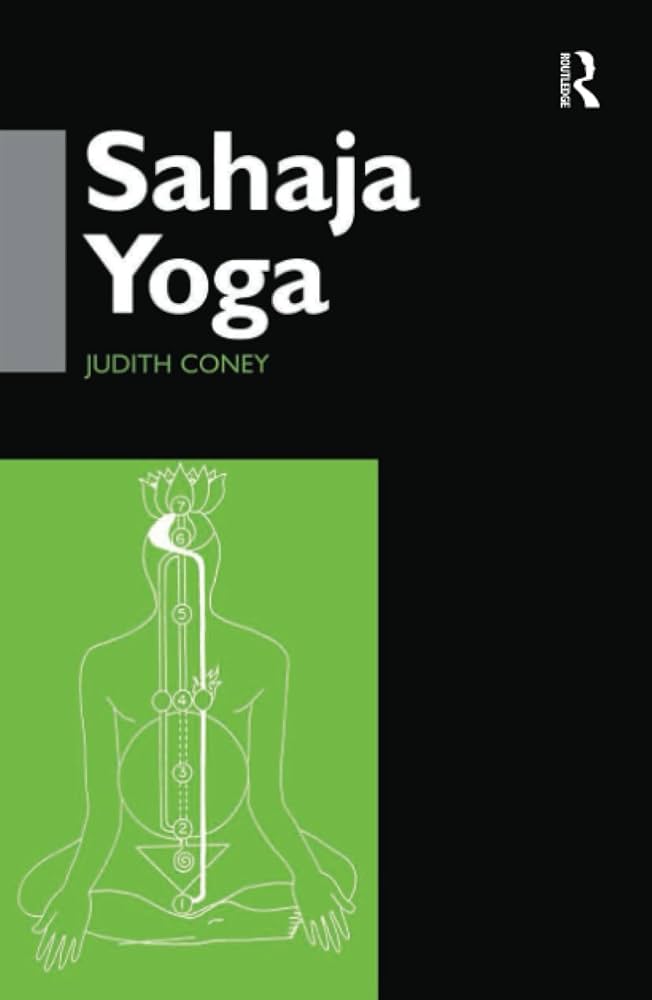
Sociologist Dr. Judith Coney, in her in-depth study of Sahaja Yoga, provides a neutral, academic confirmation of this experience. She writes, The result, in all three settings [Royal Albert Hall, local meeting, or private house], is that many people do feel a Cool Breeze. The coolness which is felt is usually associated with other sensations as well... Typically, the pupils of the eyes can be observed to dilate and the person will feel very relaxed and 'centred.'
[2] Coney's research, based on participant observation and interviews, documents the transformative effect of this experience. One practitioner described it as extremely timeless,
feeling as if only five minutes had passed when it had been three-quarters of an hour, and reported feeling a strong Cool Breeze
and being incredibly peaceful.
[2]
The sheer scale of this phenomenon is significant. While precise numbers are difficult to ascertain, conservative estimates place the number of Sahaja Yoga practitioners in the hundreds of thousands, in over 100 countries.[10] During the 2020 global lockdown, online Sahaja Yoga meditation sessions attracted as many as 200,000 people from 50 countries in just 26 days.[11] This is a global movement centered around a shared, tangible experience. The Cool Breeze is the unifying factor, the overriding experience
that confirms the validity of the spiritual awakening for each individual.
This empirical evidence is crucial. It moves the discussion of resurrection and the Holy Spirit from the realm of abstract belief to the domain of direct experience. The Cool Breeze is a self-verifiable reality. It does not require adherence to a dogma, but simply the willingness to experience it. This is the democratic and scientific nature of the spiritual truth offered by the Paraclete Shri Mataji. The wind of heaven
is no longer a distant metaphor in an ancient text; it is a palpable sensation available to anyone, anywhere, who sincerely asks for their Self-Realization.
7. Conclusion: The Unifying Wind of Global Spiritual Awakening
The synthesis of Gnostic theology, cross-cultural religious symbolism, and modern experiential phenomena leads to an undeniable conclusion: the resurrection spoken of by the great spiritual masters is a present-moment awakening, accomplished by the divine wind of heaven.
This sacred breath, the Ruach, Pneuma, and Qi of the ancients, is the tangible Cool Breeze of the Holy Spirit, the living expression of the Divine Mother's power. It is the agent of the second birth,
the resurrection of the living, which is the central promise of Christianity and the esoteric core of all true religions.
This paper has emphatically declared that the advent of the Paraclete, Shri Mataji Nirmala Devi, has inaugurated the age of collective resurrection. She has, for the first time in history, made the experience of this divine wind a mass reality, available to all of humanity. The Cool Breeze is the empirical, verifiable proof of this spiritual awakening. It is the overriding experience that unites the teachings of Jesus, the wisdom of the Tao, the insights of the Gnostics, and the devotion of the prophets. The tens of thousands who have felt this Cool Breeze are the first fruits of a global spiritual harvest, the living proof that the Kingdom of God is not a distant promise but a present, inner reality.
The prophecies have been fulfilled. The Comforter has come. The wind of heaven
is sweeping the worlds, not to raise the dead from their graves, but to awaken the living to their own eternal, divine nature. The Cool Breeze is the call to all of humanity to rise up, to become the spirit, and to enter the new age of collective consciousness. It is the ultimate truth, the ultimate reality, and the ultimate hope for a world desperately in need of transformation.
8. References
[1] Bloom, Harold. Omens of the Millennium: The Gnosis of Angels, Dreams, and Resurrection. Riverhead Books, 1997. As cited inResurrection is accomplished by the wind of heaven that sweeps the worlds.adishakti.org.
[2] Coney, Judith. Sahaja Yoga: Socializing Processes in a South Asian New Religious Movement. Curzon Press, 1999. As cited in
The Cool Breeze of the Spirit - A Universal Manifestation of the Divine.adishakti.org.
[3] Welker, Michael. The work of the Spirit: pneumatology and Pentecostalism. William B. Eerdmans Publishing Company, 2006. As cited in
PNEUMATOLOGY: The Cool Breeze and Its Equivalence to Judaism, (Ruach) Christianity (Pneuma) and Islam (Ruh).adishakti.org.
[4] Karkkainen, Veli-Matti. Holy Spirit and Salvation. Westminster John Knox Press, 2010. As cited in
The Cool Breeze of the Spirit - A Universal Manifestation of the Divine.adishakti.org.
[5] Chia, Mantak. Healing Light of the Tao. Inner Traditions, 2008. As cited in
The Cool Breeze of the Spirit - A Universal Manifestation of the Divine.adishakti.org.
[6] Pagels, Elaine, and Karen L. King. Reading Judas: The Gospel of Thomas and the Shaping of Christianity. Penguin Group, 2007. As cited in
Resurrection is accomplished by the wind of heaven that sweeps the worlds.adishakti.org.
[7] Lao Tzu. Tao Te Ching. As cited in
'The qi must have something to do with the pneuma mentioned by Jesus.'adishakti.org.
[8]
Ruach Ha Kodesh: Holy Spirit in Judaism.adishakti.org, https://adishakti.org/AI/Ruach-Elohim/Ruach-Ha-Kodesh-Holy-Spirit-in-Judaism.htm.
[9] Shri Mataji Nirmala Devi. Public talks. As cited in
Resurrection is accomplished by the wind of heaven that sweeps the worlds.adishakti.org.
[10]
Shri who must be obeyed.The Independent, 13 July 2001, https://www.the-independent.com/news/people/profiles/shri-who-must-be-obeyed-9263416.html.
[11]
200K people across 50 countries attend Online Sahaja Yoga meditation synt.Daily Excelsior, 20 Apr. 2020, https://www.dailyexcelsior.com/200k-people-across-50-countries-attend-online-sahaja-yoga-meditation-synt/.
Did Jesus teach bodily resurrection of the dead?
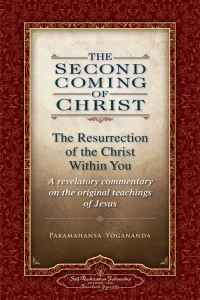
"This age of logic, having struggled out of a long dark night of
superstition, belies belief in a literal interpretation of Christ's words in
this verse. The word"graves"used by Jesus gave Biblical interpreters of little
or no direct intuitional perception the thought that after death man's soul
waits with its cold corpse entombed, able to rise only on Resurrection Day when
archangel Gabriel blows his trumpet. It appears that for twenty centuries
Gabriel has not sounded his trumpet, because the skeletons of millions can be
found still in their graves.
This misconception of resurrection, that God would keep living souls
refrigerated for years beneath the cold sod, and then suddenly warm them up to
be sent to Hades or Heaven, is baseless, revolting, injurious, and unreasonable.”- Paramahansa Yogananda
Did Jesus teach bodily resurrection of the dead?
"Do not marvel at this; for an hour is coming, in which all who are in the tombs
shall hear His voice, and shall come forth; those who did the good deeds to a
resurrection of life, those who committed the evil deeds to a resurrection of
judgment.” (John 5:28-29)
This age of logic, having struggled out of a long dark night of
superstition, belies belief in a literal interpretation of Christ's words in
this verse. The word "graves" used by Jesus gave Biblical interpreters of little
or no direct intuitional perception the thought that after death man's soul
waits with its cold corpse entombed, able to rise only on Resurrection Day when
archangel Gabriel blows his trumpet. It appears that for twenty centuries
Gabriel has not sounded his trumpet, because the skeletons of millions can be
found still in their graves.
This misconception of resurrection, that God would keep living souls
refrigerated for years beneath the cold sod, and then suddenly warm them up to
be sent to Hades or Heaven, is baseless, revolting, injurious, and unreasonable.
If that is the plan, what injustice it is that sinners and the virtuous alike,
without discrimination, have been kept waiting for centuries. Surely the just
law of cause and effect has something better to offer those who strived
sincerely to live a righteous life. Are we to believe that an autocratic God,
without rhyme or reason, dumps all souls after death under a clod of earth and
keeps them sleeping peacefully or dreaming in nightmares for centuries until His
mood suddenly chooses to command Gabriel to blow the trumpet and wake the dead?
And what of those highly spiritual souls whose bodies are not buried but were
cremated and the ashes scattered in the winds and seas?
If Gabriel sounds the trumpet tomorrow, souls who died today would wake
up after only a few hours, along with the souls who have been dead for centuries
before the time of Christ. To drug immortal souls with the sleep of death for
centuries, to gag their expression in the gloom of the tomb for aeons, to
chloroform their intelligence for millenniums, and then suddenly wake them up
and sort them out for Heaven and Hades, is an untenable conception to ascribe to
a just and loving God.
How would God select from the various grades of dead sinners and the various
degrees of virtuous people, and the babies who have had no time to be either
virtuous or evil, which ones are to go eternally to Heaven and which eternally
to Hades? From such a medley of imperfect, half-perfect, and neutral souls no
divine justice could perform any reasonable selections. If God arbitrarily makes
persons of reasonable or unreasonable mentality, souls predisposed to be either
good or bad, nudged by a favorable or unfavorable earthly inheritance, and
endows babies with reason and then lets them die before they can express their
potentials, just for the sake of variety, then this earth is a hopeless mess,
and its creatures hapless puppets dancing on strings of chance. Our common sense
tells us that there must be a wiser purpose from a Creator who is wisdom itself.
The reason and free choice of every human being must have time and equal
opportunity to evolve and express the full God-given divinity of the soul.
The true meaning of these verses becomes clear when understood in the light of
the law of karma and reincarnation.”
The Second Coming of Christ (The Resurrection of the Christ within
You) Volume 1, Discourse 21, pg. 358-359
Paramahansa Yogananda
Resurrection refers instead to the way that Christ's presence can be experienced here and now.
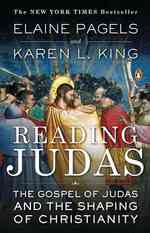
"That Jesus 'rose from the grave' to new life is a fundamental theme of Christian teaching; certainly it is the most radical. For even though most people believed in eternal life, the insistence of certain Christians like Irenaeus that their bodies would be buried, decompose — and yet rise again at the appointed time — was met not only with disbelief but with horror. Christians themselves were unclear about what kind of body this resurrected body would be. When Paul wrote about the resurrection, although his words are often mistaken as arguing for physical resurrection, he himself clearly says the opposite: 'What I am saying, brothers and sisters, is this: flesh and blood cannot inherit the kingdom of God, nor does the perishable inherit the imperishable'. (1 Corinthians 15:50). Without claiming to understand exactly what happens, Paul acknowledges that resurrection is a mystery, in which, he says, 'we will all be changed' from physical to spiritual existence (1 Corinthians 15:51:53)....
Yet Christians like this author, while rejecting the idea of bodily resurrection, do not reject life after death. On the contrary, they suggest other ways of envisioning what that life might be. The 'Gospel of Philip', for example, calls belief in resurrection of the flesh the 'faith of fools.' Resurrection, this gospel claims, far from being a single historical event in the past, refers instead to the way that Christ's presence can be experienced here and now. Thus, those who are 'born again' in baptism, symbolically speaking, also are 'raised from the dead' when they awaken to spiritual life. Another anonymous Christian teacher, asked by a student named Rheginos to explain resurrection, wrote in reply an interpretation of what Paul had taught. Although resurrection does not involve the physical body, the teacher tells Rheginos, it is indeed a reality:
...do not think the resurrection is an illusion. It is no illusion, but it is the truth! Indeed, it is more fitting to say the world is an illusion, rather than the resurrection, which has come into being through our Lord the Savior, Jesus Christ ('Treatise on the Resurrection' 48:10-19).
Struggling to speak, as Paul had, of 'mystery,' this teacher suggests that resurrection is 'the revelation of what is, and the transformation of things, and a transition into newness.' Yet descriptions like these, he acknowledges, are only 'the symbols and the images of resurrection'; Christ alone, he says, brings us into its reality ('Treatise on the Resurrection' 48:30-49:9).”
Reading Judas: The Gospel of Thomas and the Shaping of Christianity
Elaine Pagels and Karen L. King, Penguin Group, pp. 83-87
The resurrection of the body is unintelligible.
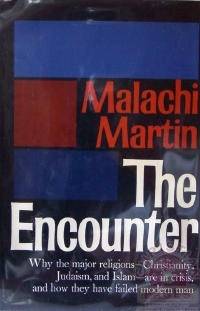
"The doctrine of bodily resurrection, linked closely to the soul's nature and destiny, suffers like a fate. The ancients knew little or nothing about the human organism—its chemical constituents, its functioning parts, its psychology—and even less about the nature of death. Modern man has measured corruption, can detail the chemical changes that take place when bodily life ceases, has a clear idea of what precisely corruption and decay of the human frame connote, and defines human death precisely by the cessation of the observable functions of the body. The three religions define death as the moment when the soul leaves the body.
On the other hand, the scientist cannot accept the 'outside' explanation: that a god will 'resurrect' the corrupted body. He knows that in a living body today the actual molecules which compose it were not part of it some time ago. In another decade it will be made up of molecules which at present are elsewhere: in African lions, in passion-flowers of the Amazon, in Maine lobsters, in earth in Patagonia, and in the fur of a Polar bear. For the scientist, the body as such has truly ceased to exist. No 'shade' or reduced form of the body exists in an' underworld' or in Elysian fields. The body has ceased to exist. He therefore finds the resurrection of the body unintelligible.”
Malachi Martin, The Encounter,
Farrar, Straus and Giroux, 1970, 286.
A resurrection of the body is the very last thing that Jesus, or any of his true followers, would want.
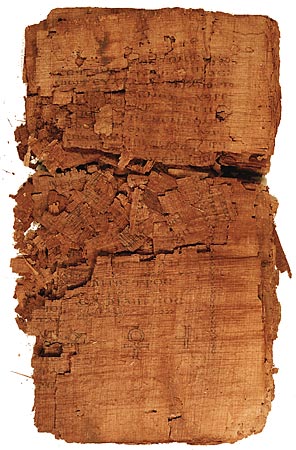
Gospel of Judas text "It will strike many readers as odd that the Gospel of Judas ends where it does, with the so-called betrayal. But it makes perfect sense given the views otherwise advanced in the book. The death of Jesus is a forgone conclusion: All that is needed is the means by which it will occur, and Judas does his part in making sure it will happen. That is why he 'exceeds' all the others.
There will be no resurrection. This is perhaps the key point of all. Jesus will not be raised from the dead in this book. Why would he be? The entire point of salvation is to escape this material world. A resurrection of a dead corpse brings the person back into the world of the creator. Since the point is to allow the soul to leave this world behind and to enter into 'that great and holy generation'—that is, the divine realm that transcends this world—a resurrection of the body is the very last thing that Jesus, or any of his true followers, would want.
View of Salvation
That, of course, is the goal of Jesus' true followers as well. This world and all its trappings are to be transcended. That can occur when the soul learns the truth of its origin and destination, and then escapes from the material prison of the body.
This teaching becomes clear in a key conversation between Judas and Jesus, in which 'this' generation—that is, the race of people here on earth—is contrasted with 'that' generation, the realm of the divine beings. Some people belong to this generation, some to that one. Those with the divine element within belong to that one; only they can be saved when they die. When the others—of 'this' generation— die, that will be the end of their story. As Jesus says,
The souls of every human generation will die. When these people [i.e., those who belong to the realm above], however, have completed the time of the kingdom and the spirit leaves them, their bodies will die but their souls will be alive, and they will be taken up.
In this way of understanding, humans consist of a body, a spirit, and a soul. The body is the material part that clothes the inner soul, which is the real essence of the person. The spirit is the force that animates the body, giving it life. When the spirit leaves the body, the body dies and ceases to exist. For those who belong only to this human realm, the soul then dies as well. As Jesus later says, 'It is impossible to sow seed on [rock] and harvest its fruits.' In other words, without a spark of the divine within, there will be no ongoing life. But for those who belong to the realm above, the soul lives on after death and is taken up to its heavenly home.”
The Gospel of Thomas, pp. 110-2
National Geographic 2006

Now, one may say that Bible is the last word. It is not so, because it has not been able to explain many things. It talks of Holy Ghost but they do not know what Holy Ghost is. They say it's a mystery. And also, Christ himself has said that you are to be born again. But they do not know what it is be born again. For them it's just somebody comes up with little water, puts it on your head and say you are born again, you are now you are a Christian. You have become a Christian.
The Paraclete Shri Mataji, Ghent, Belgium—20 September 1982
Who will tell them? No one can talk to them. As soon as one wants to talk one can be killed. This is the only way they know - how to kill.”
The Paraclete Shri Mataji
Meta Modern Era, Divine Cool Breeze Books, 1997, p. 15

In modern times I find the world is full of tribulations, problems, tensions and a shock that any day we all may be finished. This of course is very dangerous, no doubt, but also it creates an emergency within us and at the time of emergency person starts thinking about deep, about his life, much more deeply. And in depth he finds that there must be some solution. After all God has not created us to be destroyed by some person just pushing a button in America or in Russia to finish us off. There must be some solution. And the solution is that you have to achieve your eternal life. The time is such. Today the time is such. The time as I call is the blossom time. On the tree of life there were three, four flowers in the beginning. Today there are thousands of flowers who are to be transformed into fruit. They are to be done because the time has come, they are ripped enough, they have got everything. Just it is to be triggered. Once it happens to you, you can do this to other.
The Paraclete Shri Mataji, Sydney, Australia—10 March 1985
The Paraclete Shri Mataji
Houston, Texas, USA — October 7, 1981
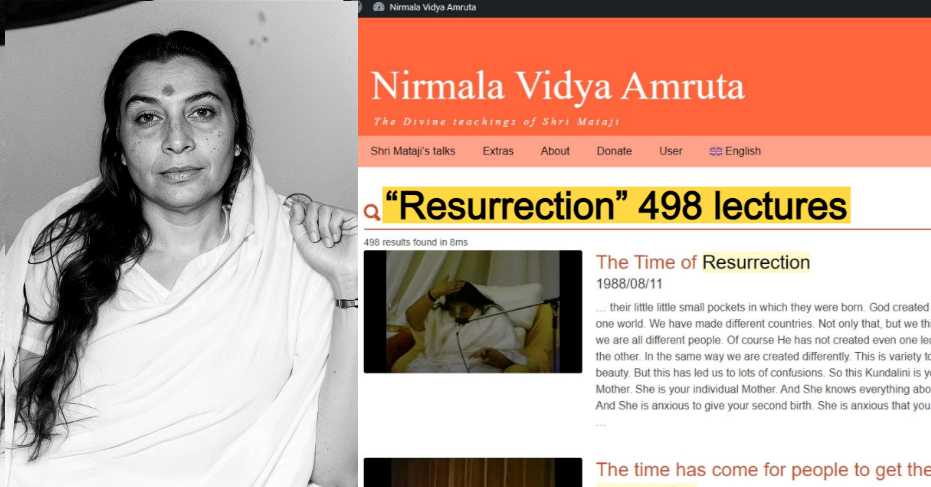
I was very happy to hear your questions, which gives Me a little idea as to what you are seeking. Today, we are standing at a position in the history of time, where the Day of Resurrection has come. This time was to come, was prophesized. And that prophecy has to be fulfilled by someone. At the very outset, one has to understand what are we to seek, and what is our resurrection.
The Paraclete Shri Mataji, Paris, France—3 May 1982
Once I happened to meet a fellow, a Muslim from Bosnia and he told Me, 'I want to die for my religion, for God's sake.' I said, 'But why? Who told you to die?' He said, 'Now, if I die in the name of God, I'll be resurrected.' I said, 'it's all wrong. That's not the way it is going to work out. Resurrection is going to work out this way that at this time, all these souls will take their birth. All these souls will take their birth and they will be resurrected. As human beings they'll have to come.'
That's why we find all kinds of funny people these days, all kinds of cruel, criminal, all kinds of idiotic, stupid, I mean very queer, weird, funny ideas which find such, such a variety of people and such a tremendous population that we should understand they have to have their chance of Resurrection. But how many will come? That's the point. How many are going to come?”
The Paraclete Shri Mataji
Philadelphia, USA — October 15, 1993
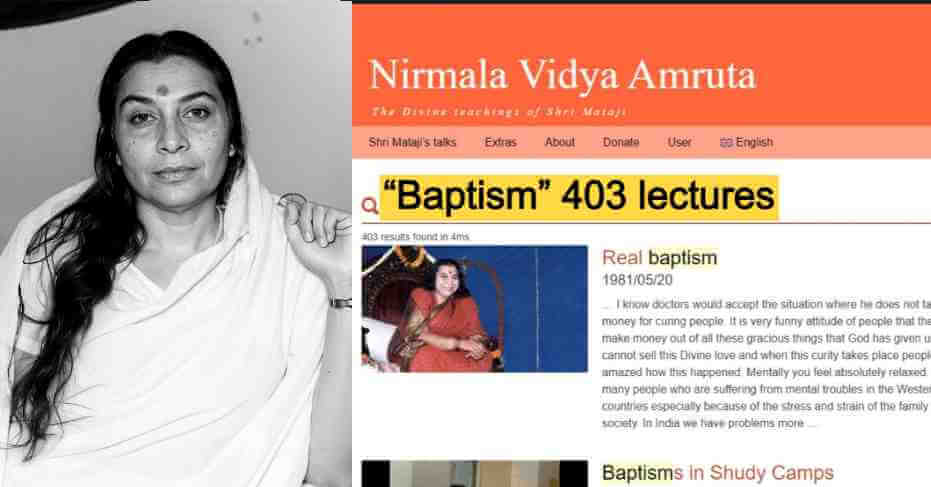
The Spirit is the reflection of God Almighty within yourself. And the Kundalini is the Holy Ghost, which is the Power of God, which is the Primordial Mother, expressed within you as the Kundalini. So we have got within us that power, shakti, and the Shiva, sitting in your heart. So this Kundalini has to rise to give you realization. The baptism, the real baptism. Not an artificial one.
The Paraclete Shri Mataji, Melbourne, Australia—10 March 1983
The Paraclete Shri Mataji
India — December 25, 1993
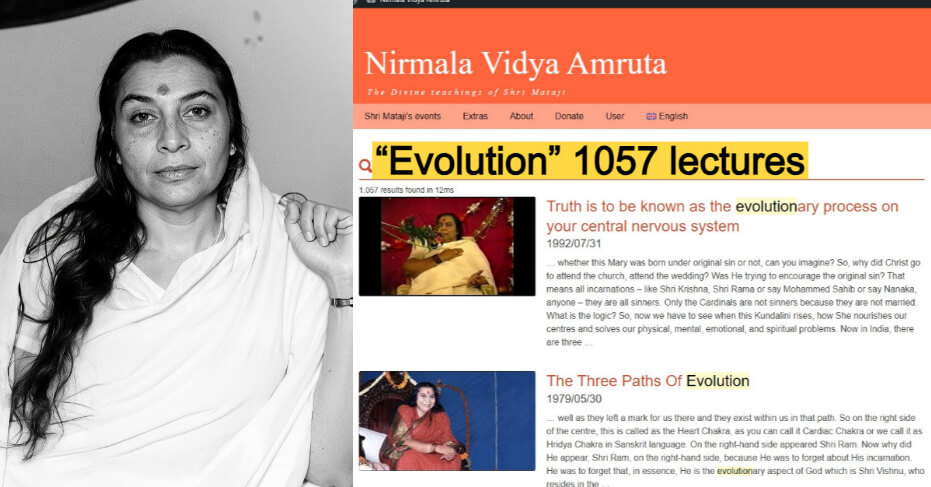
Truth is to be known as the evolutionary process on your central nervous system. It is not mental knowledge. Now, I will tell you what is the truth. You have to keep your mind open like scientists and treat whatever I am saying as a hypothesis and if it is proved, then you have to accept it as honest people, because it is for your benevolence and for the benevolence of the whole world.
The Paraclete Shri Mataji, Warsaw, Poland—31 July 1992
But it is a living process of our evolution and if it is done by the Power of a living God, then it has to be very simple, has to be very easy ...
Today that Time has come. That Time has come. The Time of Judgment has come and at this Time we have to see that we'll be judging ourselves; but not by some sort of an authority, but by something which is within us which we call as the Kundalini, is placed in the triangular bone called as sacrum. Just see, Greeks knew about it. That's why they call the bone as sacrum. But what is this bone in the biblical understanding? It is the reflection of the Holy Ghost.”
The Paraclete Shri Mataji
London, UK — May 5, 1980

